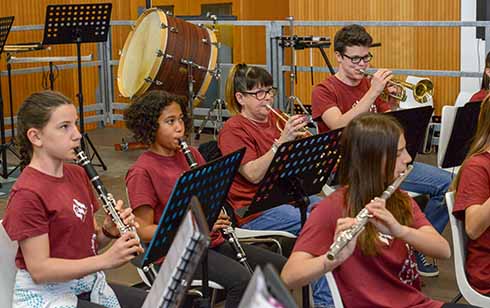 Harmony doesn’t just happen; it requires work and commitment. This year’s World Interfaith Harmony Week includes the inaugural International Day of Human Fraternity on 4 February.
Harmony doesn’t just happen; it requires work and commitment. This year’s World Interfaith Harmony Week includes the inaugural International Day of Human Fraternity on 4 February.
For unskilled listeners to music harmony is the pleasant sensation caused by sounds that fit together. In many musical compositions, harmony comes as a resolution to discord when sounds clash with one another. This echoes life where, our lives may come together only after a long period of struggle, or where we find inner piece only after much inner turmoil or pain. To live in harmony with ourselves, with others and with our world is both a great gift and achievement.
RELATIONSHIPS REQUIRE WORK
The same is true in our human relationships, both personal and those between different communities. Living harmoniously together does not happen by chance, whether in families, churches or societies. Conflicts of opinion, jealousies, rivalries and fears are part of life. To make harmony out of discord we need to be ready to apologise, to forgive and to work at our relationships.
This is especially true in the relationships between religious groups which are the focus of World Interfaith Harmony Week (1-7 February). In many cases believers mostly mix socially with people of the same religious group. They are often also divided from people of other faiths by race, ethnic origin, customs and first language. If they believe that they are members of a group especially chosen by God, they may also slip into believing that God has not chosen people of other religious beliefs. They then see others as rivals or enemies. They see the existence of difference as discord instead of the material out of which harmony can be built.
WHAT STORIES DO WE TELL?
One of the main contributors to religious harmony or discord is the kind of story we tell about our relationships with people of other religions. This is true more generally of all human communities. Among families who have lived in the same town for generations, the stories that people learn about each other from childhood will colour the way they see one another. If they tell of wrongs suffered, the relationships are likely to be hostile. Any new conflict will simply add to the list of grievances. If they tell of generosity during hard times, fresh friendships are likely to grow and allowances made for bad behaviour.
Similarly, if a religious group tells stories that suggest others are inferior, are hated by God or are stupid, those attitudes will be shared by the next generation. Stories of massacres carried out by members of another religion, or of contempt that they have shown for one’s own sacred beliefs and practices can have deadly effects. As the stories are retold they generate prejudice, with the result that the members of other groups are no longer seen as persons but as objects of hatred. In the medieval Catholic Church appalling stories told about Jewish people who profaned the Blessed Sacrament only to find that the host turned into human flesh fed an anti-Semitism which later contributed to the Holocaust.
BE GENEROUS
In order to build religious harmony we should share stories of generosity, and get to know the stories that other people tell of themselves. These stories that bless us if we share of them are of shared living, of shared grief, of shared prayer, of gratitude for unexpected generosity, of friendship, of brothers and sisters rather than enemies, of fellow strugglers rather than competitors, and of people united in a sense of what and who matters.
Telling these kinds of story can turn discord into harmony.